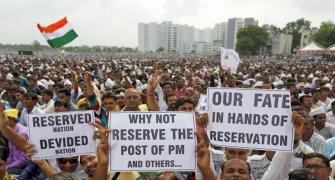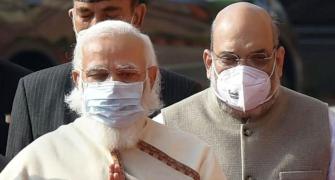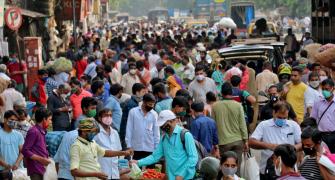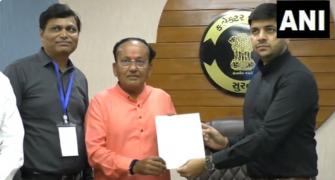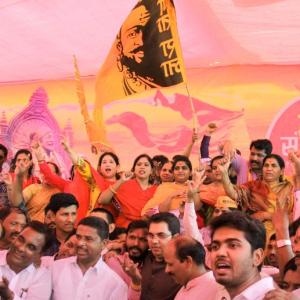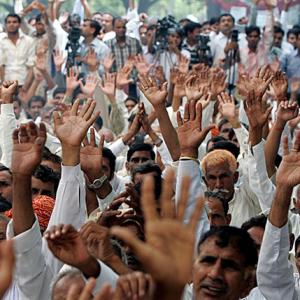Tamil Nadu's unending legislative fight for exemption from NEET has now flagged the question if it's time to review the Supreme Court's famous verdict in the 'Mandal case', fixing 50-per cent upper-limit for all reservations, asks N Sathiya Moorthy.
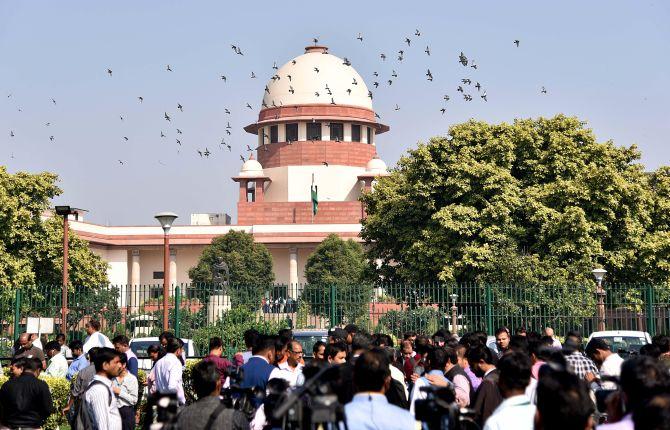
Tamil Nadu's unending legislative fight for exemption from NEET cutting across electoral identities has now flagged the question if it's time to revisit and review the Supreme Court's famous verdict in the 'Mandal case', fixing 50-per cent upper-limit for all reservations.
Along with it comes the even larger question on the Constitutional validity of the Emergency-era provision in the 42nd Amendment that moved 'education' from the state list to the concurrent list under the Seventh Schedule of the Constitution.
There is an argument that a single swallow does not summer make and the non-willingness of a single state could not and should not tamper with the NEET scheme, ordered by the Supreme Court in the first place, for the whole nation to follow.
This takes us to the 'basic structure' of the Constitution as outlined by the court's Kesavananda Bharati verdict (1971). The question is if a single state or a group of states not forming the majority could seek 'basic structure' protection stating that the Constitution's inherent federal provisions have been violated in their case.
The Constitution does not recognise political parties as entities but election laws under the same statute acknowledge their presence and role, and hence necessity.
The question is if similar bills passed by elected legislatures in a state under different political regimes do not reflect the mood of the state and thus its demand on the 'federal principle' as applicable to individual states constituting the Union of India.
In the case of NEET exemption, the Tamil Nadu assembly first passed two bills in 2017, then under the then government of chief minister Edappadi K Palaniswami, one each for UG and PG entrance exams for medical admissions.
The House passed a near-similar bill last month when moved by the successor government of Chief Minister M K Stalin. The 234-member House passed the 2017 bills unanimously, while this time the four-member BJP group staged a walk-out without actually voting against it.
In 1992, the Supreme Court's Mandal verdict (Indra Sawhney vs State of Karnataka) laid down a 50-per cent cap on all reservations. It coined the phrase 'creamy layer', to deny quotas for better-off beneficiary sections in individual caste structures to ensure the trickle-down spirit of the founding fathers worked on the ground.
The court has since provided an opening for states seeking a higher limit to justify their claims in a scientific way.
Tamil Nadu's 69-per cent quota, capped at 50-per cent by the Mandal verdict, belongs here. By juggling it between prime policy and the court order each academic year since then, the state only managed to increase the number of seats available for engineering and medical education over a period, thus erasing the efficacy of its own intention, at least partly.
The EPS government appointed the Justice A Kulasekaran committee to collect caste data to justify the 69-per cent quota before the Supreme Court.
The Stalin government named the Justice D Murugesan commission to assess representation for government school students (from poor socio-economic background) in technical education. The latter submitted its report in about a month's time.
Separately, the Stalin government appointed the Justice A K Rajan committee to study the NEET issue, rather a socio-economic profile of the 'beneficiaries'.
The 165-page Rajan report, since published in full, for instance, makes out a case against the apex court's NEET verdict unintentionally creating a new crop of 'creamy layer' of students who alone could afford high-cost private tuitions.
The report has tabulated figures to defend its recommendations though questions are being asked about the 'scientific manner' in which the data was collected.
Unlike in the case of traditional reservations, here the 'creamy layer' cuts across all divisions of caste and religion, thus defeating the spirit of the Mandal verdict, though it is not applicable to the letter of the same.
The Madras high court too has since admitted a petition from a Dravida Munnetra Kazhagam legislator, seeking to revert 'education' to the state list under the Constitution.
Already, cases for and against NEET exemption are pending before the higher judiciary. Earlier the Supreme Court calls up all such cases, including those for and against NEET and those for and against the 'internal reservations' (for government school students in Tamil Nadu, for instance), easier could be the end-game. Or, so it seems.
There are reasons. In the immediate context of NEET exemption plea, this submission may owe to Parliament amending the Medical Council Act for conducting the court-ordered common entrance exams for medical admissions across the country.
It could well be a long process as the Supreme Court is the ultimate authority to decide on such matters, and the delay could lead to confusion and contradictions should other high courts too are moved in a similar fashion.
There are other specific instances where procedures laid down by the Supreme Court have remained the law of the land without the legislature questioning it.
The Mandal verdict is among the two most cited instances. The S R Bommai case verdict (1994) is the other. Under this verdict, the court, among others, sought to curb mala fide exercise of the Centre's Article 356 powers to dissolve elected state governments and made all decisions in the matter ipso facto 'justifiable'.
Likewise, in the Vishaka case (1997), the apex court laid down guidelines to protect women at the workplace.
Through the Prakash Singh case (2006), the judiciary sought to ensure the 'independence' of top-rung police bosses in states by fixing a fixed two-year tenure with accompanying conditionalities.
The executive, both at the Centre and in the states, have followed these court orders to the 't' without either moving a review petition or passing a legislation, to fortify or undo the spirit and content of the judicial orders and observations in these cases. So is it in the case of the 'creamy layer' issue in the Mandal verdict.
Under the Kesavananda verdict and even otherwise, 'judicial review' is a 'basic structure' of the Constitution. However, the Ninth Schedule, incorporated in 1951 as a part of the First Amendment, protects select legislation of the Centre and the states approved by Parliament, from judicial review.
The Supreme Court has since ruled that even laws under the Ninth Schedule cannot escape judicial review if it violated fundamental rights or the 'basic structure'.
However, there is still ambiguity about the protection given to Tamil Nadu's 69-per cent reservations law, over and above the 50-per cent upper-limit under the Mandal verdict.
Thus, there is a clear case for the Supreme Court and/or Parliament revisiting the situation and discuss and debate the issues concerned and questions involved.
Much water has flowed through the Ganga and Cauvery since the Mandal verdict 30 years ago. It is more so in Tamil Nadu, where social activism of successive governments since before Independence has created ground situations unlike in other states, which the nation has not been able to view without bias and/or ignorance.
In doing so, the courts and Parliament need to look also at the need now for a ruling DMK legislator, possibly with the blessings of the party-cum-government leadership in the state, to challenge a provision of the 42nd Amendment, passed as far back as 1976, a full 45 years ago.
After all, the Constitution still defines India as a 'Union of states' and such union was also a creation of the Constitution.
Or, at least that is how Parliament and judiciary have treated legal and legislative issues -- from the perspective of 'Constitutional nationalism' as different from other forms, including 'cultural nationalism', which has a hoary history and reverence unconnected to the former and inapplicable, too, hence.
It is this dichotomy or the reappearance of the chasm that seemed to have been at work when Tamil Nadu erupted over the Jallikattu issue in 2017 and over the Cauvery water dispute with neighbouring Karnataka for decades now.
To dismiss it all as a part of 'Dravidian separatism' and dating it back to the days of 'Periyar' E V Ramaswami and his Dravidar Kazhagam can again be a reflection of inadequate understanding of the Tamil realities.
It needs to be borne in mind that the Dravidian polity gave up its reservations to the Indian scheme and the Constitutional system once it dumped the 'separatist call' as far back as 1960, and discovered that the two had facilitated the undivided DMK to assume elected, democratic power not long after, in 1967.
Tamil Nadu especially has remained 'Dravidian' despite change of phases and leaderships, against all imaginations and hopes, first by the Congress and now the BJP ruling the Centre. It owes not to the political colour of the parties in power, but their people-friendly policies that discriminates in favour of the majority -- economically poor, social underdogs -- and not the other way round.
That is where NEET too hurts.
N Sathiya Moorthy, veteran journalist and political analyst, is Distinguished Fellow and Head-Chennai Initiative, Observer Research Foundation.

